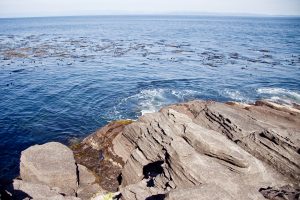
Coastal and marine ecosystems in Puget Sound and the Strait of Juan de Fuca are expected to experience continued increases in sea surface temperatures, sea level rise, and ocean acidification. These changes are expected to have implications throughout the marine food web, affecting organisms at the bottom (such as phytoplankton and marine plants) and at the top (such as salmon and marine mammals) of the food chain.
Increasing sea surface temperatures are expected to negatively affect salmon populations, increase the magnitude and frequency of harmful algal blooms, and may increase growth rates in eelgrass beds. Sea level rise is projected to increase the area of some coastal habitats, like tidal flats and salt marshes, and decrease the area covered by other habitats, like estuarine beaches and tidal swamps. Additionally, sea level rise increases coastal erosion rates and the risk of flooding.
Ocean acidification will likely harm many estuarine species, especially shellfish and other organisms that form calcium-based shells. Efforts to reduce climate change-related effects on marine ecosystems are increasing. Tribes recognize the need for long-term monitoring in order to prepare and adapt for the future.
View more climate impacts